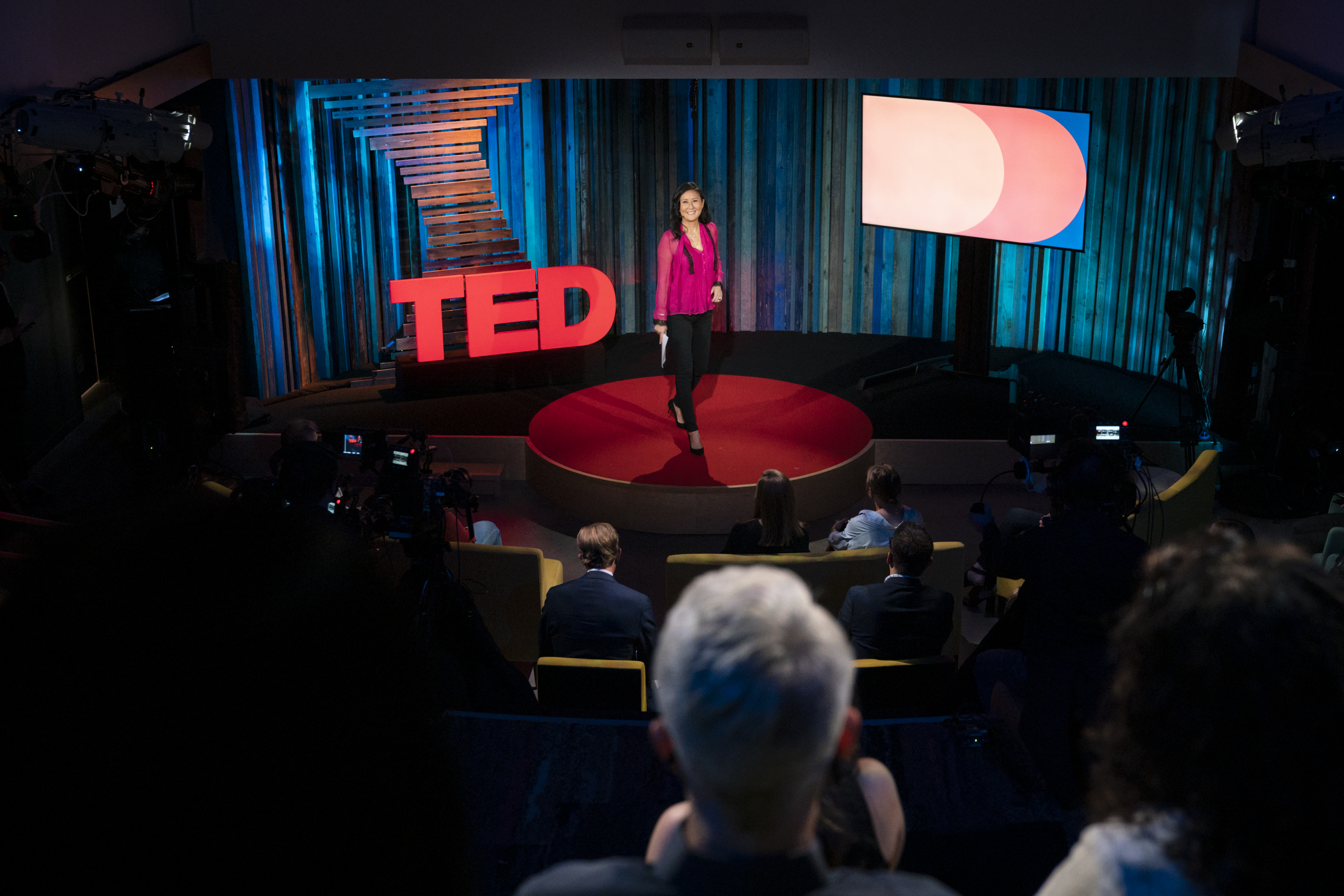
Lisa Choi Owens, TED’s Head of Partnerships, welcomes the audience to TED@BCG: Recalibrate 2021, held at the TED World Theater in New York City. (Photo: Ryan Lash / TED)
As the world opens up and we move out of crisis mode, the most important lesson might be that change and disruption will continue to happen frequently and dramatically. So the question becomes: How can we adapt? In a day of talks and performances, a range of speakers explore how to harness creativity and imagination to redefine tech, business, government and society for the better.
The event: TED@BCG: Recalibrate is the eleventh event TED and Boston Consulting Group have co-hosted to spotlight leading thinkers from around the globe. Hosted by TED’s Head of Partnerships Lisa Choi Owens, with opening remarks from Rich Lesser, Global Chair of BCG.
Music: A serene, smoldering performance from the French band Kimberose along with the East-African retro-pop sound of singer-songwriter Alsarah.
The talks in brief:
Warren Valdmanis, private equity investor
Big idea: Good jobs make for committed employees, profitable companies and interested investors.
How? Oftentimes, investors pride themselves on leaning out a company to boost its profit — but Warren Valdmanis believes that there is another way. By shifting the focus to creating good jobs, rather than cutting labor costs, companies have the opportunity to create a thriving environment that attracts employees, customers and investors. But what is a “good job”? Valdmanis breaks it down to four parts: Fair treatment, a promising future, psychological safety and a sense of purpose. When all these elements come together, mission-driven companies take care of the people bringing that vision to life and, in turn, they get creative, profitable returns. “Good jobs aren’t just good for society,” Valdmanis says. “They are good business.”
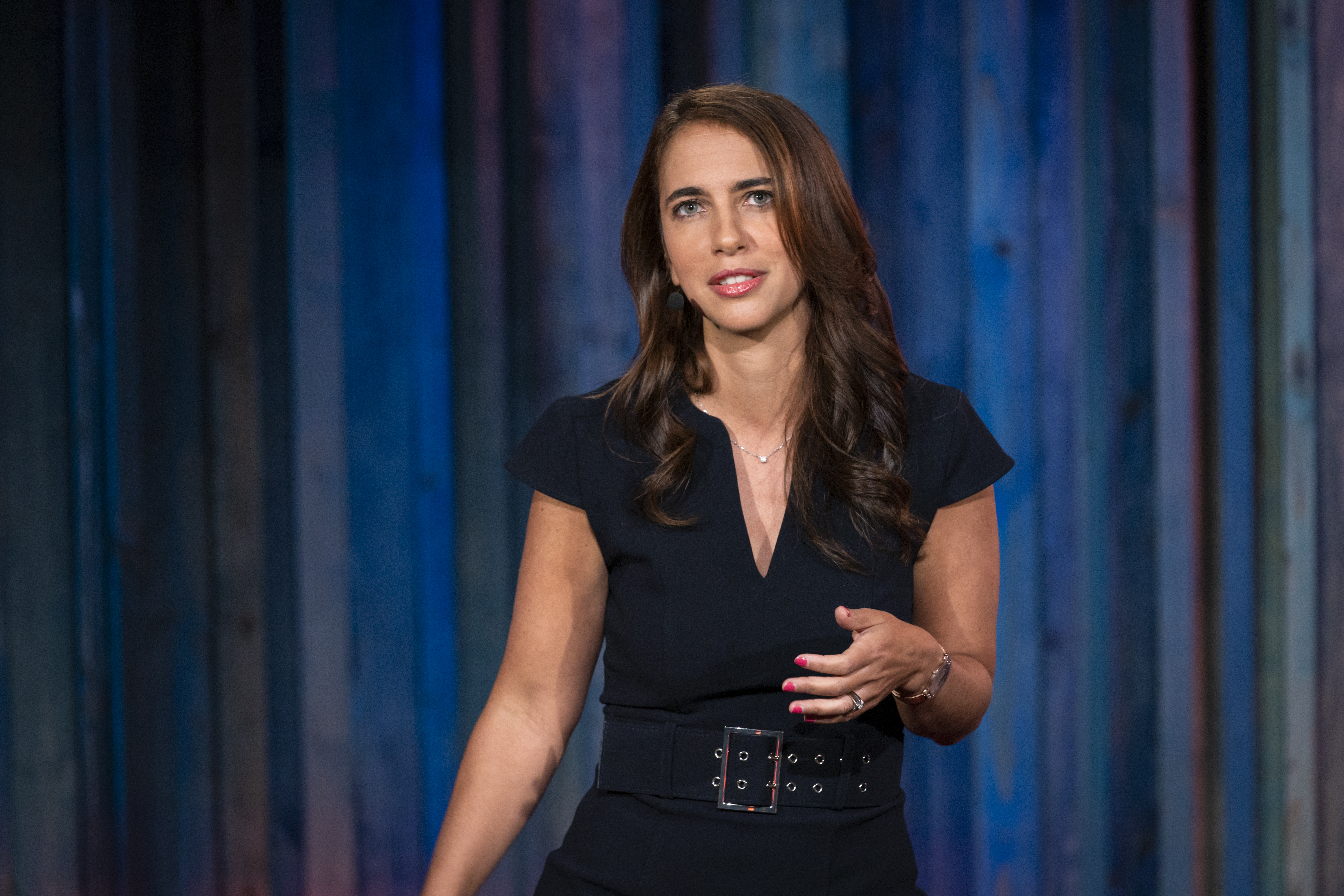
What will the next generation of smart digital assistants look and sound like? Karen Lellouche Tordjman offers answers at TED@BCG: Recalibrate 2021. (Photo: Ryan Lash / TED)
Karen Lellouche Tordjman, customer experience professional
Big idea: There are two key challenges to crack in order to usher in the age of smart digital assistants.
How? From Siri to Alexa, digital assistants already permeate our lives. But, according to Karen Lellouche Tordjman, engineers must still overcome two crucial obstacles before digital assistants start to feel like a truly indispensable part of our lives. Obstacle one: voice. Currently, digital assistants have a relatively limited level of fluency, struggling with such things as accent, background noise and the different meanings of words within different contexts. But, with 10,000 Amazon employees working on Alexa’s voice technology alone, we could soon see leaps in the performance of voice interfaces. Which brings us to obstacle two: breadth of recommendations. Right now, most recommendation algorithms stay in one lane, specifically recommending things like videos, music, clothing items and the like. The next generation will be able to do everything, Lellouche Tordjman says, offering an integrated and wide range of recommendations across product categories. Once that happens, smart assistants may soon feel as necessary as our smart phones.
Massimo Russo, data cooperation expert
Big Idea: Sharing data can help us solve climate change. Here are three research-backed ways for companies to actually do it.
How: We are in a dilemma, says Massimo Russo. If we want to defeat climate change, we need to optimize our cities and systems — and that requires sharing data. (In researching the most effective climate change solutions, Russo and his team found that 85 percent of the best plans require more data sharing.) But the companies that have this crucial data are often reluctant to share it, falling susceptible to what he calls “FOMA”: fear of missing out on competitive advantage. But there is a ray of hope — companies are more likely to share their data when it serves a greater common goal, like solving climate change. Russo offers three ways for companies to jumpstart an altruistic cycle of innovative data sharing: first, companies should look for new, unexpected sources of and partners for data. For example, farmers could look to satellite information systems to help them decide when and what to plant. Second, companies should quickly develop new sustainability solutions, which includes hiring climate scientists to use data and digital innovations together to create effective solutions. Finally, companies should act together for change. In cities, this could look like transportation hubs and utility companies sharing data so each can optimize their operations. We need data to find our way out of climate change — and the quickest way is to share.
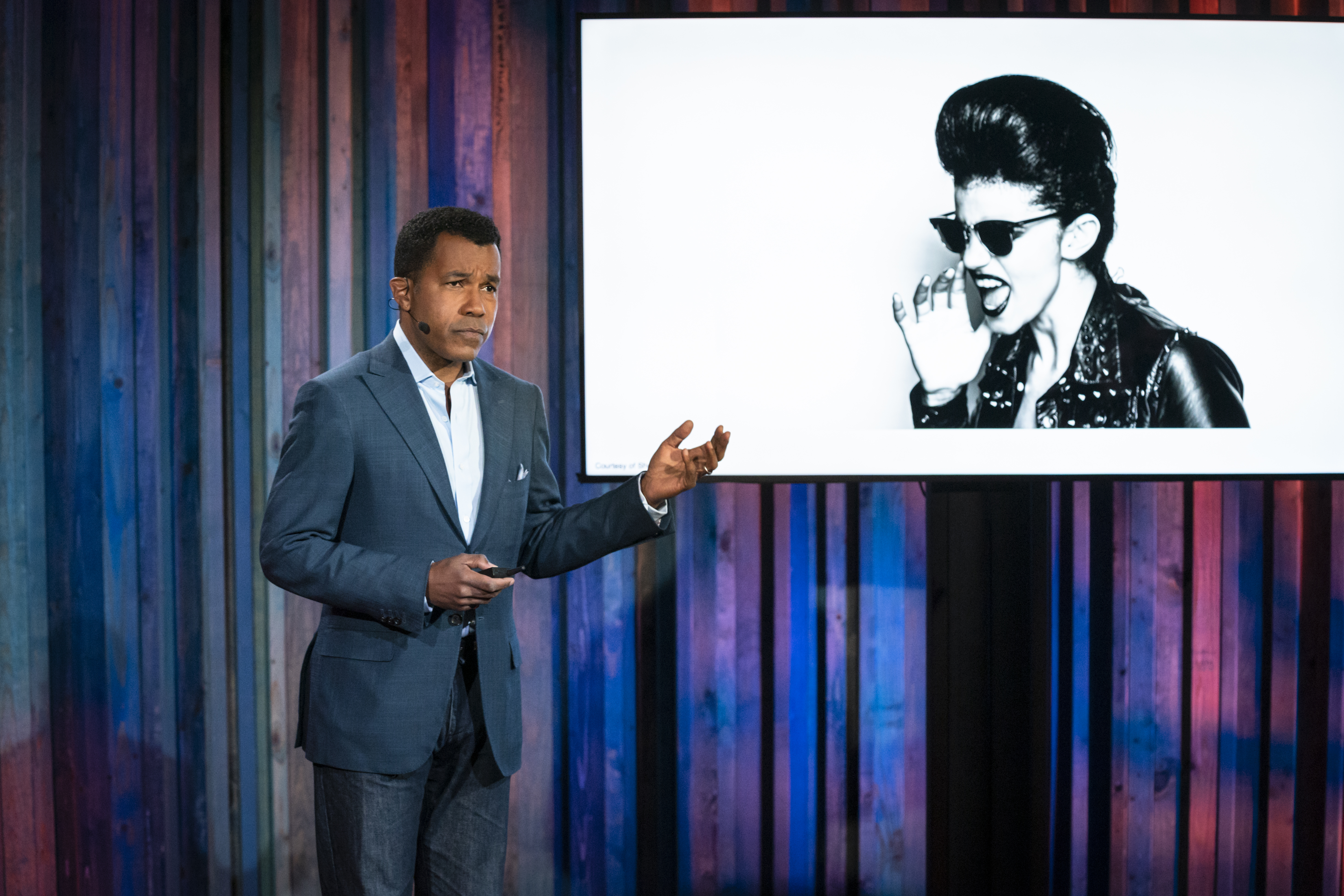
Richard Thompson Ford takes a fascinating historical walk through the rise and power of fashion at TED@BCG: Recalibrate 2021. (Photo: Ryan Lash / TED)
Richard Thompson Ford, civil rights and gender equity lawyer
Big idea: Let’s try to check our biases before calling the fashion police.
Why? The fashion police are real — or, at least, the laws and policies that empowered them, which still echo and influence modern biases everywhere from school to the workplace. Richard Thompson Ford takes a fascinating historical walk through the rise and power of fashion, and how it’s more about status than statement when what’s considered appropriate is often clouded by stereotypes, snap judgements and limited experiences. But dismissing dress codes doesn’t instantly dissolve the tensions around who should wear what, Ford explains. There’s nuance to be understood when it comes to culture, self-expression and archaic beliefs of what constitutes professional dress. And while no tailor-made solution exists to divest society of such haute judgment, he encourages everyone to outfit themself to think twice about clothing and the people in them.
Zoe Karl-Waithaka, development visionary
Big Idea: Marketing can dramatically improve the lives of African farmers.
How? The development community (NGOs, philanthropies and international development agencies) traditionally focuses on helping African farmers grow their foods — but they should help them grow their markets, too. Zoe Karl-Waithaka points to the success of avocado and milk campaigns in the United States as examples of how marketing created a whole generation of guacamole eaters and milk drinkers. She says there are three ways marketing can help African farmers grow a market for their products. First, the development community can fund world-class marketing campaigns to promote African foods, both in domestic and international markets. Second, as a large procurer of food, African governments can provide a consistent market for farmers’ goods. And finally, farmers should band together to promote their crops, like jointly funding marketing campaigns through cooperatives. By pooling their resources together, farmers would be able to make a bigger marketing splash. These principles of marketing don’t just apply to African farmers, says Karl-Waithaka. They could be used to promote healthier and more climate-friendly foods, too!
Dustin Burke, supply chain expert
Big idea: We’re overdue for a true streamlining of supply chains to create real resiliency in the face of major crises.
How? Supply chain challenges are real, but they’re not new, says Dustin Burke. Some chains are simple — like buying strawberries from a local farm — but others are complicated, such as the approximately thirty thousand parts from numerous separate manufacturers that it takes to build a car. Even in light of disruptions ranging from natural disasters to pandemics and political instability, Burke asks why companies have yet to make their supply chains more resilient. The answer is straightforward: steep competition and clashing priorities always win when there’s no apparent crisis. Burke suggests developing better ideas that could potentially beat out those constant pressures, which boil down to sharing risk, radical transparency and automated recommendations. He believes that with the assistance of AI and machine learning today, companies (paired by need) could share resource costs and help create a more resilient, efficient tomorrow.
Charlotte Degot, green technologist
Big Idea: To reduce emissions, companies need to measure them accurately — and AI can help.
How? Colorless, scentless and invisible — greenhouse gases are hard to measure, explains Charlotte Degot. But getting an accurate estimate of pollution is vital to setting meaningful goals to reducing it. Enter: artificial intelligence. AI can help process and optimize massive amounts of data to help wean out misinformation and turn the data into useful patterns. For example, Degot points to an international wine and spirits company — from the glass that makes up their bottles to the liquid inside them, they have countless processes to track. Without AI, most of the information is inaccessible to the corporation. But, by having more reliable figures instead of rough estimates, corporations can set meaningful climate targets, identify concrete initiatives and recalculate emissions over time. To put it simply: “You cannot reduce what you cannot measure,” Degot says.
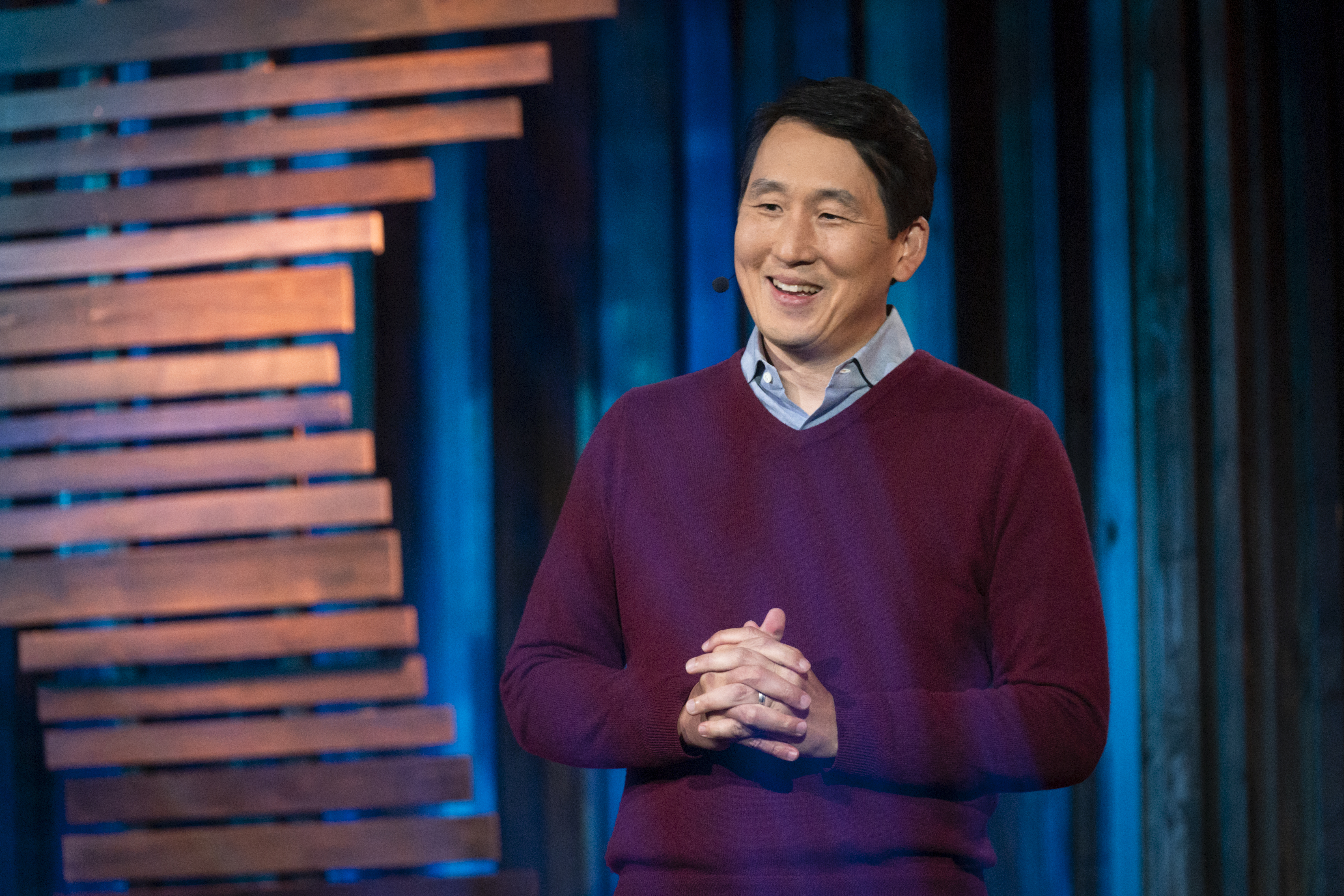
James Rhee shows the value of not only investing dollars in your business, but also time and heart. He speaks at TED@BCG: Recalibrate 2021. (Photo: Ryan Lash / TED)
James Rhee, goodwill strategist
Big idea: Goodwill and kindness can reshape a business for the better.
How? Lots of people are demanding that we rethink capitalism — how we treat our employees and one another. But are we focused on the right things? What really creates value? James Rhee, the former CEO of the fashion brand Ashley Stewart, shares the story of how he pulled the company back from the brink of bankruptcy by cultivating the transformative power of kindness at work. By creating a culture of goodwill, inviting customers into marketing and creative efforts and centering people over profits across all operations, Rhee shows the true value of not only investing dollars, but also time and heart.
Martin Reeves, business strategist
Big idea: Play isn’t just about fun. It’s also a helpful and advantageous business exercise in imagining what could be.
How? Martin Reeves shows how in business, play is not only possible but urgently essential in a world that demands companies reinvent themselves in order to stay afloat. He invites the audience to play a series of games that he uses to get executives to stretch their thinking. These thought experiments inspire a fresh look at business-as-usual by flipping it on its head in ways that both humble and motivate the thinker in the direction of new possibilities. Failures to imagine in business are really failures in leadership, Reeves says. By unlocking and harnessing the innate creativity within, companies have the opportunity to uncover new disruptive strategies and keep a foothold on the future.
Larry Irvin, TED Fellow and education innovator
Big idea: Representation and diversity in teaching is vital to a student’s education. In the US, Black men make up less than three percent of teachers in schools — and this needs to change.
How? While teaching a summer program, Larry Irvin wanted to gain a better understanding of his students. So he asked them the age-old question: “What do you want to be when you grow up?” The answers he heard from his young students of color existed within the confines of outdated narratives that Irvin is committed to changing by working to increase teacher diversity. He created a program called Brothers Empowered to Teach that provides education, opportunity and job placement through a holistic, people-centered approach. By recruiting and training more Black teachers, educators provide a mirror to their students — and vice versa. “Just one Black male teacher in third, fourth or fifth grade for a low-income Black boy substantially reduces his chances of dropping out of high school by almost 40 percent,” Irvin says.
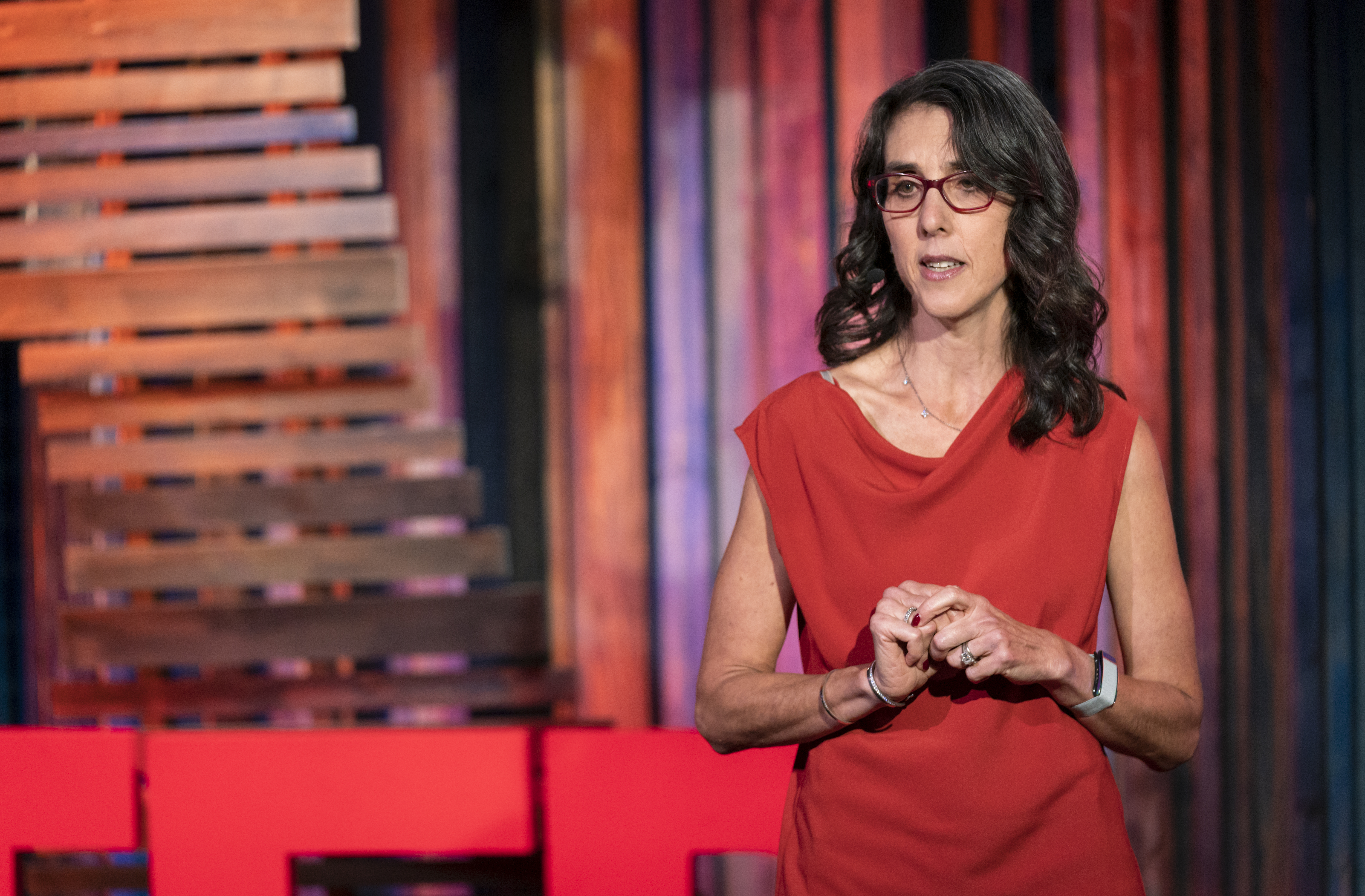
How should we reimagine work coming out of the pandemic? Debbie Lovich says we must do three key things. She speaks at TED@BCG: Recalibrate 2021. (Photo: Ryan Lash / TED)
Debbie Lovich, work futurist
Big idea: We have an opportunity to create a future of work that is more engaging, productive and humane.
How? Over the past 18 months of the pandemic, there’s been no shortage of conversations about the future of work. To Debbie Lovich, it’s abundantly clear that going back to a work life dictated by a fixed time, place and job description doesn’t make any sense. Employees have enjoyed unprecedented autonomy during the pandemic, and they’ve developed great work practices along the way. Now’s the time to bottle those practices and do away with the rigid, sluggish, bureaucratic ways of the past. To get the future of work right, Lovich says we must do three things: first, trust your people (they’ve proven they deserve it); second, be data-driven (survey people to see what they like about the new way of working, and experiment based on that feedback); and third, think beyond the schedule (reimagining, or even eliminating, things like long commutes, recurring meetings and silo work). If we do all this, we can stop contorting our lives around work — and instead reshape work to better fit our lives.
Axel Reinaud, biochar entrepreneur
Big Idea: Biochar is an exciting climate, agricultural and a renewable energy solution that can help farmers increase crop yields while reducing the amount of CO2 in the atmosphere.
How? Photosynthesis is the most effective form of carbon sequestration … but what happens when plants and trees are burned? All the carbon that was captured by the plants is released back into the atmosphere. Enter: biochar. Biochar is a form of carbon made when organic ingredients are superheated without oxygen. It remains stable for hundreds of years and when sown into soil, its porous structure helps plants retain the important water, nutrients and microbes they need to thrive. Moreover, the production of biochar produces an abundant renewable source of energy. So why isn’t biochar more popular? Axel Reinaud explains that the price of biochar is too high — but things are changing. He outlines three ways to bring biochar to scale: first, improve access to the biomass needed to produce biochar; second, develop more efficient production systems that can create biochar and power a renewable energy grid 24/7; and third, encourage farmers to use biochar more, which would help reduce the amount of damaging fertilizers used and increase crop yields.